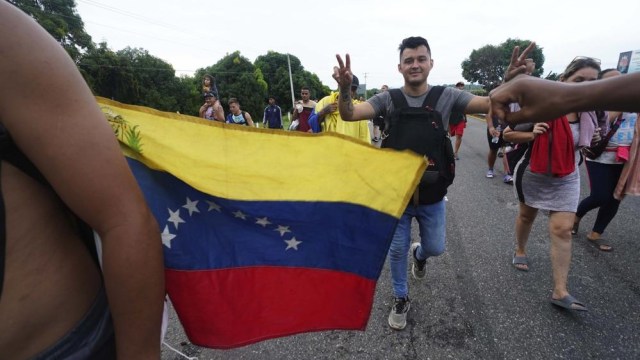
Arbelys Briceño fixed her eyes on the chicken soup in the plastic container set before her, the first warm meal she’d had in days. She began eating slowly, almost hesitantly, but then picked up the pace – and snagged another serving when soup kitchen workers offered seconds.
By AP News – Regina García Cano
Aug 31, 2022
It was her eighth day on a journey from her Venezuelan hometown to Peru, a country the 14-year-old couldn’t place on a map but that her older brother had set as their destination. Mosquitoes had marked her legs. The sun had baked her face.
“It is as if it were a vacation but with lots of walking,” Arbelys said with an outlook far more upbeat than that of most Venezuelan migrants trying to escape poverty in their once-prosperous country.
About 6.8 million Venezuelans have left their homeland since an economic crisis took hold in earnest in 2014 for the country of some 28 million people. Most have gone to nearby nations in Latin América and the Caribbean. More than 2.4 million are in Colombia, where Arbelys and her brother had paused on their trek.
That huge migration slowed as the pandemic cut economic opportunities and complicated travel across the region and as Venezuela’s socialist government adopted reforms that slowed the country’s economic free-fall and gave some appearance of revival.
About 150,000 Venezuelans returned to their homeland at the height of the coronavirus pandemic, according to United Nations’ estimates, and some host countries reported a decline in the overall count of Venezuelan immigrants for the first time in years.
But the outward march is on the rise again.
At least 753,000 Venezuelans have left their country for another in Latin America or the Caribbean since November, according to data from receiving countries, even as the government of President Nicolás Maduro continues to tout economic growth. Colombia, which had not reported updated figures since November, posted a jump of roughly 635,000 between that month and August.
By the time Arbelys, her sister and their brother reached Colombia, they had walked about 370 miles (600 kilometers). She had been unable to sleep one night – they had stayed on a sidewalk and she was startled by noises. She slipped and fell twice as they walked along a muddy back road to cross the border.
Her brother, on the journey for a second time, knew better than to allow the harsh sun to crisp his skin and slathered his face with sunscreen, which had formed streaks on his forehead.
Outside the soup kitchen in Los Patios, about 4.5 miles (7.5 kilometers) inside Colombia, migrants quickly cram around an outdoor table once the chain link fence door opens.
Some learned from friends or other migrants about the operation, whose cooks prepare upward of 40 gallons of soup for each meal at two sites.
Jhon Alvarez, coordinator of the Fundación Nueva Ilusión – roughly New Hope Foundation in English – said he is increasingly seeing familiar faces at the soup kitchen.
“People are returning from the other countries – Chile, Perú, Ecuador, Bolivia – again to Venezuela, but after 15 days or a month they can’t stand it, and they come back,” Álvarez said.
He said they tell him, “’Look, I had to come back because the situation is still the same (or) it’s worse. They raised the minimum wage, yes they did, but there’s no work.’”
Nowadays, 48% of migrants surveyed by a network of assistance agencies cited lack of employment and low salaries as their main reason to leave Venezuela, while 40% mentioned difficulties obtaining food and basic services, according to the Venezuelan office of the United Nations High Commissioner for Refugees.
Maduro has taken steps to halt the country’s economic decline, chief among them ending strict foreign currency controls, leading to a de facto switch from the Venezuelan bolivar to the U.S. dollar. That broke a years-long cycle of hyperinflation and helped ease chronic shortages.
Restaurants, imported goods stores, exercise studios and other businesses have opened in the capital, Caracas. Maduro recently said the country’s economy grew 17.4% during the first three months of 2022.
…
Read More: AP News – Venezuelan migration picks up, reaches about 6.8M
…

